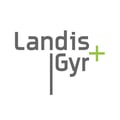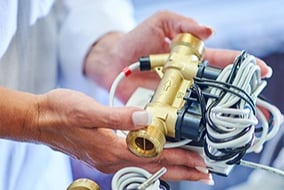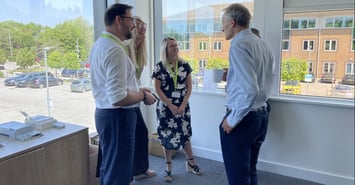For decades Germany has played a pioneering role in transforming the way energy is generated, distributed and consumed in Central Europe. Thus it should come as no surprise that a major utility company in the state of Baden-Wuerttemberg is leading the trend to increased digitization in the energy market.
 EnBW, with headquarters in Karlsruhe, is revolutionizing the management of renewable energy sources through its subsidiary network operator Netze BW and advanced technology from Landis+Gyr. The project involves the installation of 3,000 S750 grid modules from Landis+Gyr to manage decentralized renewable energy sources in the 100 kW to 1 MW range. The first units were laboratory tested and then installed in several photovoltaic plants. Now the rollout is ongoing.
EnBW, with headquarters in Karlsruhe, is revolutionizing the management of renewable energy sources through its subsidiary network operator Netze BW and advanced technology from Landis+Gyr. The project involves the installation of 3,000 S750 grid modules from Landis+Gyr to manage decentralized renewable energy sources in the 100 kW to 1 MW range. The first units were laboratory tested and then installed in several photovoltaic plants. Now the rollout is ongoing.
EnBW has been relying on project expertise from Landis+Gyr for decades. This particular development is just one of many milestones that have been achieved through the collaboration of both companies. What’s more, the unique aspects of the German energy market, and the regulatory legislation governing energy generation and distribution throughout the country, have also been significant factors that have encouraged partnerships in research and development among utility companies and other leading market players.
An alliance for the future of energy
In 2000, the German parliament passed the Renewable Energy Sources Act, or EEG (Erneuerbare-Energien-Gesetz) as a first step toward modernizing and deregulating the energy market, especially in the area of electrical power generation. Utility companies and policymakers had long been aware of the fact that changes needed to be made in the way energy is produced, managed and consumed. Dwindling fossil fuel sources, concerns about the consequences of nuclear power and the importance of preserving the environment by reducing CO2 emissions were key factors that would eventually reshape the future of the energy market, which had been governed by a rather simple “supply and demand” business model followed by a limited number of players.
The EEG was intended to diversify and open up the market, enabling small renewable energy companies to compete on a level playing field. This was a remarkable paradigm shift that revolutionized the energy market – by moving from a centralized structure to a diverse and decentralized approach.
But this development also had a side effect. Diverse and deregulated energy generation, distribution and even consumer billing are very complex matters that require innovative technologies for metering and managing loads and grids. Communicating information and tracking key data in real time were completely new aspects. Prices for renewables also vary, and grid operators needed to have mechanisms for balancing their power generation to ensure price and delivery stability. These and many other factors called for new approaches to energy management at all levels. And this is what led to the long-term business partnership between EnBW and Landis+Gyr.
Innovation through shared expertise
In response to the challenges posed by the dramatic change in energy policy, Germany’s three leading utilities – EnBW, RWE, and E.ON – formed a consortium to launch the SyM2 (Synchronous Modular Meter) project. The purpose of the initiative was to establish open standards that would lead to the development of smart meter technology to replace proprietary and incompatible metering systems. In light of more than a century of innovation in the field of electrical technology, Landis+Gyr was selected by the consortium to support the SyM2 project with in-depth research and manufacturing expertise.
In addition to optimizing utility processes, smart technology would be expected to handle network management, customer service functions, the management of grid processes and microgeneration. Interoperability and easy installation were also key parameters. To deliver this kind of functionality, smart meters and modules would need to provide authentic data in real time, be completely based on IP communication and feature open modularity.
Landis+Gyr came up with a unique multi-modular metering solution, the SyM2-E750 smart meter. In addition to meeting project specifications, the Landis+Gyr technology represented a cost-effective method of providing the entire market with affordable systems and freedom of choice through open standards, not to mention easy provisioning and installation.
More than a decade of development of future-proof technology
The launch of the GM-EEG (S750) by Netze BW is a logical extension of decades of collaboration as Landis+Gyr continues to enhance this groundbreaking SyM2-based technology with advanced features and new system devices. “We were looking for a customized solution that would provide the right compatibility and communication technology for this project, namely the SyM2-compliant Ethernet Bus communication module (SyM2-CU) GSM/GPRS, and Landis+Gyr’s S750 grid module delivered just that,” says Enrico Lang, Technical Project Manager at Netze BW. The first modules were installed in the town of Wendlingen in August 2015 in a rooftop photovoltaic array run by EnBW directly. With an output of 800 kW, it is the perfectly sized facility to act as the test bed for the new technology. The technology rollout will continue throughout the utility’s photovoltaic generation facilities in Baden-Wuerttemberg. The S750 grid module is a crucial component of the solution for managing the electric feed-in from large and medium-sized solar, wind, and other renewable energy power plants in conjunction with SyM2-based modular metering platforms for commercial and industrial customers.
The S750 grid module also allows companies to retrieve real-time information from individual solar generation facilities, enabling quick responses to changing grid conditions. “Thanks to the S750, data can be communicated in real time. What’s more, active and reactive power can be switched and controlled as required. The plants controlled by this module are easily integrated in our SCADA system infrastructure,” adds Selma Lossau, Project Manager for S750 Grid Module at Netze BW. “The S750 complies with the new regulations that took effect on January 1, 2016, which require that all decentralized energy sources with an output of more than 100 kW are required to have functionality that allows the energy generated to be distributed to the network directly. – that’s why it’s the best future-proof solution for us.”
The energy market in Germany is advancing at a remarkable pace, and the microgeneration of renewable energy is booming as never before. Policy makers and utility companies are under constant pressure to ensure that market conditions provide for the secure, balanced and affordable provision of electricity based on an increasing share of renewables. This can only be achieved through digitization, which is why Landis+Gyr continues to focus on intelligent metering and grid solutions that boost efficiency, provide transparency and promote customer involvement to support the “energy turnaround” in Germany.
Digital technology sustains intelligent energy management
The EEG has been revised many times over the past 15 years; the most recent change in energy policy was enacted on July 8, 2016, with the passing of the Act on the Digitization of the Energy Transition by the German parliament (see information box). Among other things, this legislation mandates the technical specifications that will apply to energy management in the digital age, and it aims at having up to 80 percent of all end consumers using smart metering solutions in the future. Another significant aspect of the law is data security and data privacy, which must be ensured in all metering and grid technologies that will be installed in the future.
Act on the Digitization of the Energy Transition (2016) – Federal Republic of Germany
The purpose of the Act on the Digitization of the Energy Transition (Gesetz zur Digitalisierung der Energiewende) is to support the harmonization and orchestration of electric power grids, power generation and consumption using modern digital technology. The legislation defines the technical specifications for smart metering solutions. Mandatory directives for ensuring data privacy and interoperability are also specified in the law.
Intelligent metering systems must fulfill all of the specifications defined by the Federal Office for Information Security (Bundesamt für Sicherheit in der Informationstechnik – BSI). Digital metering solutions must provide for reliable data capture, processing and communication, along with secure protocols, storage and data deletion processes for information originating from smart metering. Transparent energy consumption data for customers is also mandated. The provisions of the law apply to consumption of levels of 6,000 kWh or more annually.
About EnBW
EnBW Energie Baden-Wuerttemberg AG was founded in 1997 and is one of the largest energy suppliers in Germany and Europe. With a workforce of some 20,000 employees, EnBW provides utility-related products and services to 5.5 million customers. The company promotes the “energy turnaround” in Germany with the slogan “Energiewende. Sicher. Machen.”
Its subsidiary Netze BW GmbH has some 3,500 employees who are responsible for the safe and efficient distribution of electricity, gas and water for most of Baden-Wuerttemberg. The subsidiary delivers electricity to 2.65 million customers.
Visit our European Utility Week page on renewable integration to learn more:






